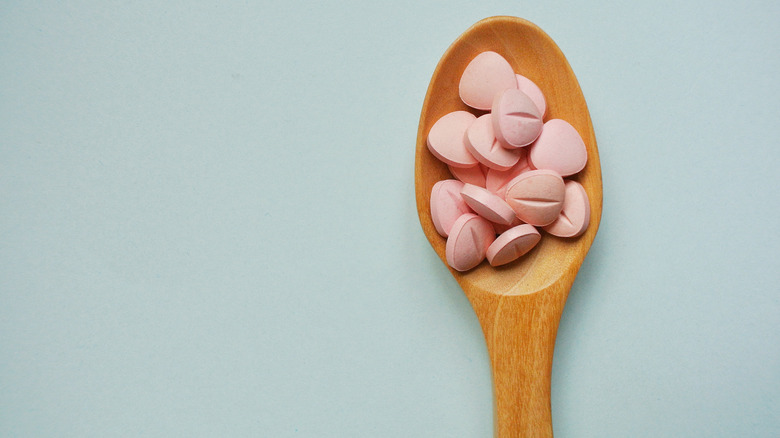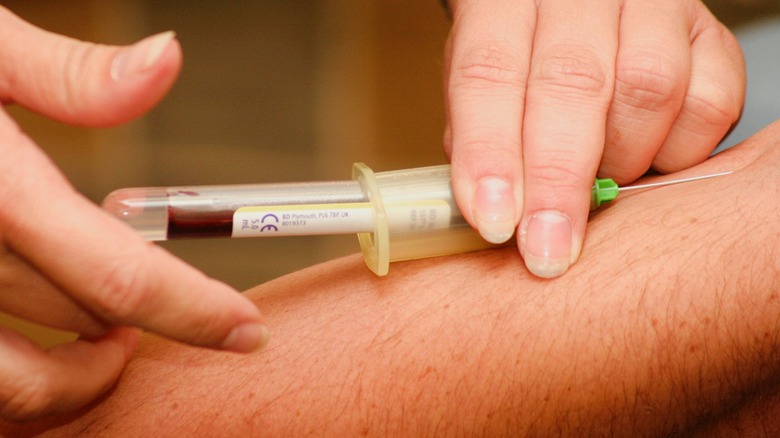Unexpected Health Benefits Of Popcorn
We can all agree that no movie night is complete without a heaping bowl of popcorn to go with it. But the good news is, just because you're watching your waistline or being more health-conscious doesn't mean you need to set that snack aside. As WebMD notes, when you cut down on the butter, salt, and oil, popcorn is actually a healthy, low-calorie snack with a wide range of benefits.
According to the American Heart Association, air-popped popcorn can be a great way for people who are trying to readjust their eating habits to add some easy whole grains to their diets. It's a great source of fiber and is rich in antioxidants, which can improve circulation and overall digestive health. In addition, popcorn's status as a whole grain means that it has the potential to be a powerful ally against heart disease, and even certain cancers. Here are just a few reasons to pile on the popcorn the next time you sit down on the couch for a night in front of the TV.
It's loaded with fiber
The U.S. Department of Agriculture (USDA) notes that popcorn is a 100% whole grain, with just one serving providing about 15% of the amount of fiber that most people need daily. The high fiber content in popcorn means that it's good for digestion and regularity, and also very good at keeping you feeling full throughout the day, which means you tend to eat less. It's also good for heart health and promotes the formation of healthy gut bacteria, which further increases digestive health.
A 2013 review in the British Medical Journal showed that a high-fiber diet is connected to a lower risk of cardiovascular disease and coronary heart disease. Additionally, another 2013 meta-analysis, this one in the Proceedings of the Nutrition Society, showed that an increase in fiber intake lowered people's risk of diabetes by 6%. With the average person requiring about 25 grams of fiber per day, and one 3.5-ounce serving of popcorn containing approximately 15 grams of fiber, popcorn is a great way to up your diet's fiber count.
Popcorn is packed with antioxidants
The health benefits of adding antioxidants to your diet have been well-documented. It could help to reduce the risk of developing heart disease, prostate cancer, degeneration of the eye's lenses, and cognitive decline. Antioxidant-rich foods include fruits, legumes and beans, and whole grains and cereals. Popcorn is full of plant-based antioxidants called polyphenols, which can improve circulation and digestion, while also helping to stave off disease, according to Healthline.
There have been a number of studies that have shown the beneficial antioxidant properties of popcorn, including a 2012 study by the University of Scranton (via ScienceDirect). According to that study, the amount of polyphenols present topped off at around 300 milligrams per serving. By comparison, a serving of sweet corn contains 114 milligrams, while fruits offer up 160 milligrams of polyphenols. One serving of popcorn can provide 13% of a person's daily average intake. In addition, the polyphenol levels in popcorn rivaled those in nuts or whole-grain tortilla chips.
Popcorn is a great source of vitamin B
A staple of a healthy diet, the so-called vitamin B complex is comprised of eight B vitamins, according to Healthline. These vitamins play an important role in brain function, digestive health, muscle tone, and strong eyesight. It can also be beneficial for pregnant and breastfeeding women, and may boost testosterone levels for men as they grow older.
Of the eight vitamins present in the B complex, three of them — thiamin, niacin, and pyridoxine — can be found in popcorn. A 100-gram serving of air-popped popcorn contains approximately 7% of the recommended daily intake (RDI) of thiamin, 8% of the RDI of pyridoxine, and an impressive 12% of the RDI of niacin. Niacin can be useful in everything from the management of acne to raising the levels of HDL cholesterol, the so-called "good cholesterol" in the body, per Popmaize. Meanwhile, pyridoxine can help stave off heart disease and may also be a useful ally against rheumatoid arthritis.
It can be a mood booster
Tryptophan is an amino acid that your body can't produce on its own, and yet is key to producing both melatonin, which aids in sleep patterns, and serotonin, which can manage your moods, per WebMD. Tryptophan can help with depression, cognitive abilities, memory, and learning. However, because it is not made by our bodies, we need to consume tryptophan-rich foods in order to obtain our daily dose. Tryptophan can be found in foods ranging from milk to canned tuna, oats, fruits, and, you guessed it, popcorn.
According to a 2013 study published in the Journal of Nutritional Science, children who consumed popcorn and nuts before bed enjoyed longer and more restful sleep than those who consumed such foods as pizza or burgers. Additionally, popcorn is high in vitamin B3, or niacin, which according to Healthline has been shown to be helpful in helping to ward off depression, anxiety, and apathy.
It can help you control your blood sugar
People who have diabetes need to consider the glycemic index (GI) of the foods they consume, according to Medical News Today. A food's GI rating refers to how quickly sugar from the item enters the bloodstream after it is eaten. A food with a high GI rating means that sugar will enter the bloodstream faster, and therefore will cause blood sugar to spike. Popcorn has a comparatively low GI value, meaning that the body will absorb it at a slower rate, keeping blood sugar levels low.
The trick with popcorn consumption for diabetics is preparation. If you drench your popcorn in butter, oil, and other toppings, you'll negate the healthy effects and possibly cause your blood sugar to spike. Keeping it simple, with air-popped popcorn without any fatty or sugary additives or flavors, will ensure you can enjoy a healthy snack that won't tamper with your blood sugar. In addition, portion size is important, with two servings being the recommended maximum for any given time. Overindulging too much can cause weight gain and other health concerns.
It could be helpful against some cancers
Along with sweet corn and whole grains, popcorn is high in ferulic acid. This is a strong antioxidant compound known for its anti-inflammatory properties, ability to lower blood pressure, and its strength against chronic illnesses, including some cancers, as WebMD notes. One 100-gram serving of popcorn contains more than 300 milligrams of ferulic acid, making it one of the best available sources of the compound.
While the full extent of ferulic acid's cancer-fighting abilities are still being determined, a 2018 study published in Cancer Cell International showed ferulic acid's efficacy in inhibiting the proliferation of cancer cells, suggesting its possible use as an anti-cancer drug. Additionally, a 2016 study published in Oncology Reports notes that ferulic acid had in other research demonstrated the ability to potentially block the growth of and decrease tumor size in certain cancers, including colon and lung cancers. In this study, the compound showed the potential to prevent breast cancer from metastasizing.
Popcorn can be good for your bones
Everyone knows that calcium is an important element in bone health, but Healthline cites phosphorous as another mineral essential to keeping your bones strong. There are a number of foods that are rich in phosphorous, including chicken, pork, certain fish, and dairy. Popcorn is a good source of phosphorous, with a 3-cup portion offering 86 milligrams, according to Medical News Today. This amounts to nearly 10% of the recommended daily average required for adults.
In addition to phosphorous, popcorn is also very high in manganese, with a 100-gram serving containing more than half of the recommended daily intake. According to Mount Sinai, manganese is important in the building of bones, connective tissue, and blood clotting. It is also effective in fighting free radicals, which can damage the body's cells. Popcorn's high manganese content makes it a good snack for maintaining dense, healthy bones.
It's good for your blood
According to the Red Cross, iron is an important mineral in the body, and approximately 70% of it can be found in your hemoglobin, a protein that is found in red blood cells. Having iron in your blood means that your red blood cells are better equipped to carry oxygen throughout your body. Low iron can result in iron-deficiency anemia, a condition marked by fatigue and the feeling of being lightheaded.
Popcorn is a surprisingly good source of iron, with 100 grams offering more than 3 milligrams of iron, which is 18% of the daily requirement. By comparison, the USDA notes that spinach offers only 2.71 milligrams of iron per serving. Additionally, as a whole-grain food, popcorn can be effective at lowering blood pressure, according to the Mayo Clinic. The high potassium level of whole grains, as well as their ability to reduce damage to blood vessels, makes them a good addition to a healthy, well-balanced diet.
Not all popcorn is good for you
While there are most definitely many health benefits to popcorn, it's important to note that this doesn't mean you can consume any and all types of popcorn risk-free. For example, the American Heart Association notes that movie theater popcorn, while a popular snack, is generally not a healthy option. Popcorn served at the movies can have more than 1,000 calories and more than 2,600 milligrams of sodium.
You can also add microwave popcorn to the list of snacks to cut back on or avoid entirely. According to Healthline, the biggest problem with this type of popcorn is the presence of perfluorinated compounds, or PFCs. These compounds exist on the bags of microwave popcorn and are designed to prevent the oil from leaking through the bag. When heated, these PFCs can break down into perfluorooctanoic acid, which has been linked to cancer. However, if you skip the butter, oil, and fats and stick to the air-popped variety, there's nothing keeping you from enjoying a bowl of popcorn on your next movie night.










